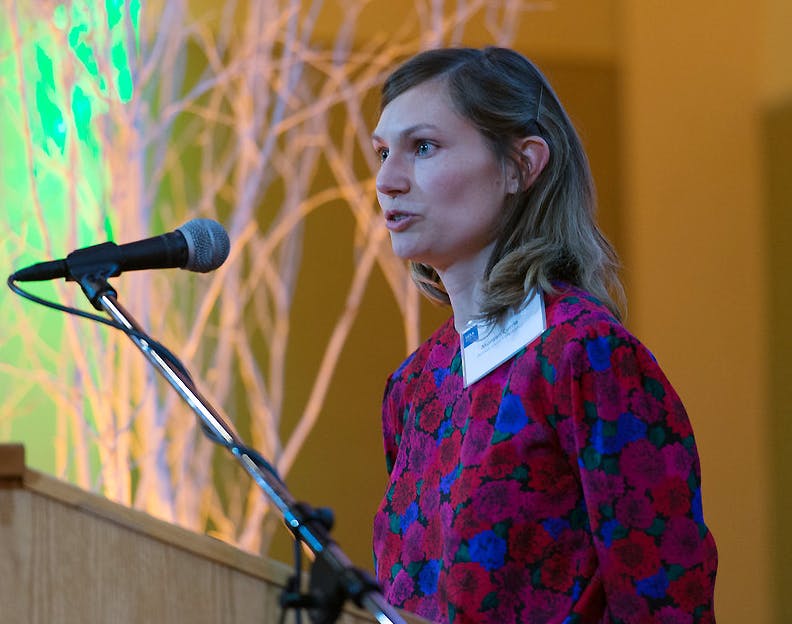IS alumna Morgan Currie (’13, MLIS; ’16, Ph.D., Information Studies) has been awarded a post-doctoral fellowship in the Digital Civil Society Lab at Stanford. She will be working with Stanford professors Lucy Bernholz and Rob Reich, the lab’s founders, researching frameworks for how civil society can use digital resources for broader public benefit.
Currie’s research examines how cultural, political, and economic factors interact with the design and development of public data infrastructures, and how these systems influence new economies, forms of governance, civic behavior, and political struggle.
Currie was selected for the fellowship to develop her proposal of a research project, based on her dissertation, about the intersection of government and private sector data.
“Government databases are often used by private companies or created with the help of private companies,” says Currie. “One example is Google Maps, using public transit data, or Waze, using street closure data in their platforms. Policing does this with predictive policing algorithms, which are proprietary. Public data on arrests and police reports have become a part of these private algorithms that then create ‘hot spots’ to determine where policing forces are going to go.”
Currie says that the immediacy of digital platforms has had a significant impact on both government and private records, and calls for an understanding of the consequences by the average user.
“[There is] more interest from the private sector [around] public data,” she says. “There have long been examples of the private sector using public data, like the weather industry. But I’d say there’s even more of an interest now [from] big internet companies like Yelp, Waze, and Google. That’s another interesting intersection of government and private industries booming now as well. The worry is that these private services turn citizens who want to use public data into [mere] consumers of these platforms.”
Currie also researches how government data spawns new forms of democratic participation.
“Events like hackathons [have] given rise to civic activity based around programming and working with data,” says Currie. “That coincided with the release of public data sets from urban data portals, specifically through [former] President Obama’s Open Data policy. Coinciding with these government websites that release data sets are [individuals] who make apps for civic purposes. One of the most successful ones in Los Angeles is one that helps navigate ‘food deserts’ [and shows] where to find resources around food using public data. It was created by volunteers who got together on their own time and made this app.”
Currie points out that the digital domain also acts as a publicity tool for government, affording it the ability to showcase how effective it can be.
“There is a lot of interest now in using public data to help governmental departments come up with metrics to track their performance over time, their promises to the public about how efficient they’re going to be, and how they’re going to address problems like keeping streets clean from illegal dumping, repairing potholes, or climate change initiatives,” she says.
Currie, who earned a master’s degree in new media from the University of Amsterdam, was drawn to the UCLA Department of Information Studies because of her previous exposure to its scholarship.
“Even though the new media program wasn’t linked to information studies, a lot of my professors in had similar research interests to professors at UCLA [Information Studies],” she says. “Through my coursework I encountered writing by Johanna Drucker, Chris Kelty, Ramesh Srinivasan, and Leah Lievrouw. My professors knew them; they ran in similar circles and all studied the effects that digital media and the internet have on society. I was already familiar with the work of these professors, and it was very exciting to study under them.”
Currie was recently a lecturer in the School of Media, Culture, and Design at Woodbury University. She has also taught an undergraduate course on “Information and Power” at UCLA. This coming academic year Currie will also be studying scientific data that needs rescuing, either because of political vulnerabilities or because of actual material or physical vulnerabilities, through the Research Data Alliance United States Research Share Fellowship.
Currie says that her interest in government data began when she first moved to Los Angeles and attempted to use phone apps to navigate its public transportation system. She was curious to understand how government data became interoperable with the platform of the phone app.
“There’s now a bigger need for research on governmental data and its stewardship by government, the public, the private sector – and a degree in IS from UCLA puts our alumni in a strong position to have a voice in shaping how these data assets can be accessed and used for public good,” says Currie.
Photo by Todd Cheney, UCLA
